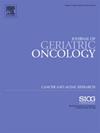接受辅助放射治疗和内分泌治疗的早期乳腺癌患者健康相关生活质量的年龄分层分析
IF 2.7
3区 医学
Q3 GERIATRICS & GERONTOLOGY
引用次数: 0
摘要
老年乳腺癌(BC)患者(≥70岁)的健康相关生活质量(HRQoL)尚未得到很好的研究。本研究评估了雌激素受体阳性(ER+)乳腺癌患者接受保乳手术(BCS)、放射治疗(RT)和内分泌治疗(ET)治疗后患者报告的结果与年龄相关的差异。材料和方法入选前瞻性多中心REQUITE研究的2057例ER+早期BC患者中,1003例接受辅助RT + ET作为唯一的全身治疗的患者构成了我们的研究人群。将患者按年龄分为年轻组(70岁,n = 810例)和老年组(≥70岁,n = 193例)。采用经验证的欧洲癌症研究和治疗组织(EORTC)癌症患者生活质量(QLQ-30)和乳腺癌特异性生活质量(QLQ-BR23),以及多维疲劳量表(MFI-20)测量前瞻性收集的HRQoL,分别在BCS和辅助治疗前、放疗后的基线和1年、2年和3年的间隔进行测量。统计分析包括方差的混合模型分析,通过倾向评分加权。结果与年轻组相比,老年患者有更高的合并症负担、更大的肿瘤大小和更高的N1疾病发生率。与老年患者(50%)相比,年轻患者(72%)对乳房肿瘤切除部位进行RT增强的频率更高。年轻患者主要接受他莫昔芬治疗(63.5%),而老年患者更常接受芳香酶抑制剂治疗(67.4%)。在整个随访过程中,我们观察到,与老年组相比,年轻患者在生活质量领域(包括性享受、全身副作用、乳房症状、整体健康状况、情感、身体和社会功能)方面恢复得更好。两组的认知功能都从基线下降,随着时间的推移,年轻参与者的认知功能有所改善,但在三年的随访期间,老年患者的认知功能仍保持在较低的水平。辅助治疗对HRQoL的影响有差异,与年轻患者相比,老年患者的不良反应更大、更持久。这些发现强调有必要针对老年BC幸存者HRQoL恢复的独特挑战进行量身定制的干预。本文章由计算机程序翻译,如有差异,请以英文原文为准。
Age-stratified analysis of health-related quality of life in patients with early-stage breast cancer receiving adjuvant radiation therapy and endocrine therapy
Introduction
Health-related quality of life (HRQoL) in older patients with breast cancer (BC) (≥70 years) is not well studied. This study assesses aging-related differences in patient-reported outcomes among estrogen receptor-positive (ER+) patients with BC treated with breast conservation surgery (BCS), radiation therapy (RT), and endocrine therapy (ET).
Materials and Methods
Among the 2,057 patients with ER+ early-stage BC enrolled in the prospective multicenter REQUITE study, 1,003 patients receiving adjuvant RT + ET as the only systemic therapy constitute our study population. Patients were stratified by age into younger (<70 years, n = 810 patients) and older (≥70 years, n = 193 patients) groups. Prospectively collected HRQoL was measured using the validated European Organization for Research and Treatment of Cancer (EORTC) quality of life of cancer patients (QLQ-30) and breast cancer–specific quality of life (QLQ-BR23), and Multidimensional Fatigue Inventory (MFI-20) measures at baseline following BCS and pre-adjuvant treatment, post-RT, and at one-year, two-year, and three-year intervals. Statistical analysis involved a mixed model analysis of variance, weighted by propensity scoring.
Results
Older patients had a higher burden of comorbidities, larger tumor size, and higher rates of N1 disease compared to the younger group. RT boost to the lumpectomy site was more often delivered in younger participants (72 %) compared to older (50 %). Younger patients predominately received tamoxifen (63.5 %), while older patients more commonly received aromatase inhibitors (67.4 %). Throughout the follow-up, we observed that the younger patients showed greater recovery in QoL domains including sexual enjoyment, systemic side effects, breast symptoms, global health status, and emotional, physical, and social functioning compared to the older group. Cognitive function, which declined from baseline in both groups, improved over time in younger participants but persisted at lower levels in older patients at the three-year follow-up period.
Discussion
Adjuvant treatments differentially impacted HRQoL, with older patients experiencing greater and more persistent adverse effects compared to younger counterparts. These findings underscore the need for tailored interventions that address the unique challenges in HRQoL recovery among older BC survivors.
求助全文
通过发布文献求助,成功后即可免费获取论文全文。
去求助
来源期刊

Journal of geriatric oncology
ONCOLOGY-GERIATRICS & GERONTOLOGY
CiteScore
5.30
自引率
10.00%
发文量
379
审稿时长
80 days
期刊介绍:
The Journal of Geriatric Oncology is an international, multidisciplinary journal which is focused on advancing research in the treatment and survivorship issues of older adults with cancer, as well as literature relevant to education and policy development in geriatric oncology.
The journal welcomes the submission of manuscripts in the following categories:
• Original research articles
• Review articles
• Clinical trials
• Education and training articles
• Short communications
• Perspectives
• Meeting reports
• Letters to the Editor.
 求助内容:
求助内容: 应助结果提醒方式:
应助结果提醒方式:


